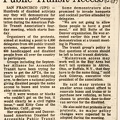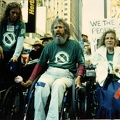San Francisco Chronicle 9/26/87
Title: 4,000 Transit Officials To Add to S.F.'s Traffic
By Harre W. Demoro
The executives of North America's 400 transit systems are gathering in San Francisco, worried that their industry is declining and bracing for handicapped people to disrupt their meetings.
The handicapped are demanding that all transit vehicles, including San Francisco's historic 37 cable cars, be accessible to wheelchairs, a demand that transit officials say is too costly.
The centerpiece of the transit gathering will be a huge trade show, which opens Monday and is expected to draw 15,000 people to Moscone Center. Its 450 exhibits of the latest bus and rail car technology from 15 countries include a gleaming new BART car that is two years behind schedule and has yet to carry a paying passenger.
About 4,000 delegates have signed up for three days of technical and professional meetings at the Hilton Hotel, said Jack R. Gilstrap, executive vice president of the American Public Transit Association.
Times have changed since Washington-based APTA met here 11 years ago. Then, the Bay Area was a transit showcase and federal officials were promising billions of dollars for a nationwide bus and subway renaissance.
Although the San Francisco Municipal Railway has prospered since 1976, the Bay Area's other big transit systems have not done well.
After 15 years, the much-heralded $1.8 billion BART system still is plagued by technical and financial problems and has been deserted by 10 percent of its riders in the last two years. BART's general manager, Keith Bernard, has taken a medical leave to escape the pressures running the controversial agency.
AC Transit and Golden Gate Transit, two bus systems that were showcases 11 years ago, also have lost riders and are grappling with draconian financial problems.
Moreover, the federal government is threatening to cut transit assistance and Reagan administration leaders now point to costly systems like BART as examples of how not to solve traffic congestion problems.
Gilstrap, formerly general manager of the huge Los Angeles bus system, said yesterday in San Francisco that he is optimistic that - the next federal administration, no matter what its party affiliation, will be pro-transit. "The nation's crumbling infrastructure must be addressed after the election," he said.
The militant handicapped people will demonstrate at Union Square at 1:30 p.m. Sunday, and also picket meetings, banquets and cocktail parties, said Bill Bolte of ADAPT, American Disabled for Accessible Handicapped [sic]. "We are not going to allow these people to have a good meal," said Bolte, who was arrested earlier this year at a demonstration at a transit meeting in Phoenix.
Gilstrap said APTA supports federal edicts calling for some vehicles and stations to be accessible`to wheelchairs and for alternative forms of transportation, such as special vans for handicapped people he said.
- Created on
- Thursday 11 July 2013
- Posted on
- Thursday 3 August 2017
- Tags
- 1/2 peak time access, 100% lift equipped, 1987, AC Transit, accessible transit, ADAPT, APTA - American Public Transit Association, BART, Bill Bolte, cable cars, Golden Gate Transit, handicapped, Jack Gilstrap, militant, Moscone, Phoenix, Reagan Administration, San Francisco, San Francisco Municipal Railway, trade show, Union Square
- Albums
- Visits
- 2019
- Rating score
- no rate
- Rate this photo


0 comments